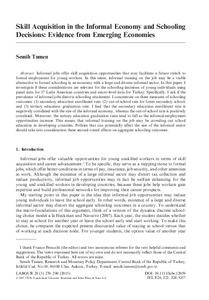Skill acquisition in the informal economy and schooling decisions: evidence from emerging economies

Labour. Review of Labour Economics and Industrial Relations
2015
29
3
September
270-290
transition from school to work ; young worker ; informal employment ; informal education
Education and training
http://dx.doi.org/10.1111/labr.12059
English
Bibliogr.
"Informal jobs offer skill acquisition opportunities that may facilitate a future switch to formal employment for young workers. In this sense, informal training on the job may be a viable alternative to formal schooling in an economy with a large and diverse informal sector. In this paper, I investigate if these considerations are relevant for the schooling decisions of young individuals using panel data for 17 Latin American countries and micro-level data for Turkey. Specifically, I ask if the prevalence of informal jobs distorts schooling attainment. I concentrate on three measures of schooling outcomes: (1) secondary education enrollment rate; (2) out-of-school rate for lower secondary school; and (3) tertiary education graduation rate. I find that the secondary education enrollment rate is negatively correlated with the size of the informal economy, whereas the out-of-school rate is positively correlated. Moreover, the tertiary education graduation rates tend to fall as the informal employment opportunities increase. This means that informal training on the job may be crowding out school education in developing countries. Policies that can potentially affect the size of the informal sector should take into consideration these second-round effects on aggregate schooling outcomes."
Digital
The ETUI is co-funded by the European Union. Views and opinions expressed are however those of the author(s) only and do not necessarily reflect those of the European Union or the ETUI.